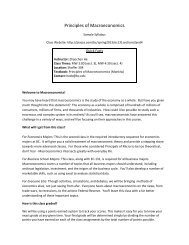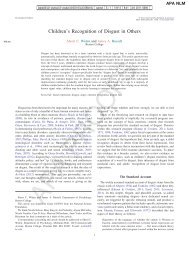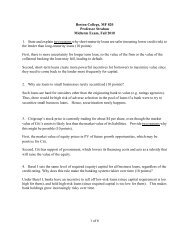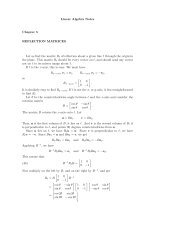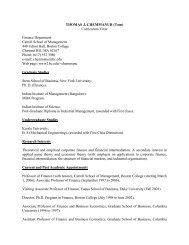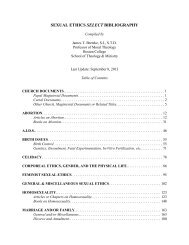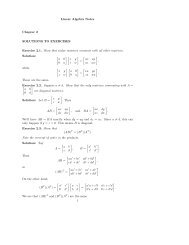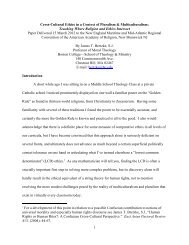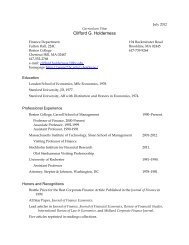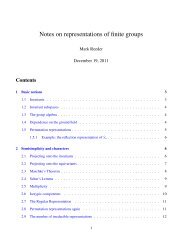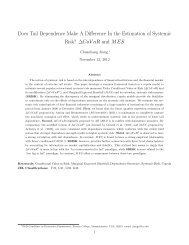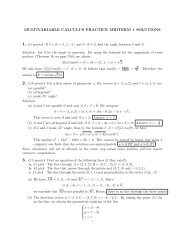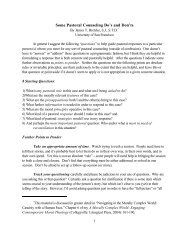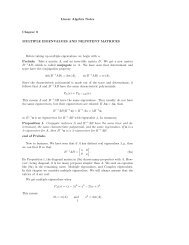Questions to the Moralist - Personal Web Server - Boston College
Questions to the Moralist - Personal Web Server - Boston College
Questions to the Moralist - Personal Web Server - Boston College
You also want an ePaper? Increase the reach of your titles
YUMPU automatically turns print PDFs into web optimized ePapers that Google loves.
May I ask you some questions?<br />
1) You mentioned somewhere in your lecture that rationalization is <strong>the</strong> dark side of a<br />
good person's conscience, and that this may be a danger in judging an act <strong>to</strong> be right<br />
when it is in fact "wrong." (Please correct me if I didn't recall it perfectly.) Why would<br />
rationalization be "dark" if it were part of <strong>the</strong> discernment process that a person goes<br />
through in making a moral decision? What is "wrong" with rationalization? Wouldn't<br />
seeking for right reasons and bringing <strong>to</strong>ge<strong>the</strong>r moral principles entail some kind of<br />
rationalization?<br />
2) What is <strong>the</strong> place of "direct knowledge" or "hunch" or "intuition" in moral decisions?<br />
Supposing a person who has gone through careful discernment -- integrating all<br />
principles and sec<strong>to</strong>rs of sources for moral <strong>the</strong>ology -- ultimately "feels" that <strong>the</strong> "correct"<br />
decision derived from <strong>the</strong> labyrinthine process of reason is "wrong," how would he<br />
understand this "deeply internal voice" which seems <strong>to</strong> stand apart from <strong>the</strong> result of his<br />
discernment?" There are situations when, inexplicably, while <strong>the</strong> mind goes through all<br />
logical efforts and right reason, <strong>the</strong> "heart" (or maybe intuition?) still prompts <strong>the</strong> whole<br />
person <strong>to</strong> do o<strong>the</strong>rwise. What <strong>the</strong>n happens <strong>to</strong> a person who goes ahead with right reason<br />
in <strong>the</strong> sanctuary of his conscience even when his "intuition" or "heart" strongly tells him<br />
<strong>to</strong> do o<strong>the</strong>rwise? And what happens <strong>to</strong> a person who, despite seeing clearly that his<br />
rational decision is right, ignores reason completely and heads on <strong>to</strong> follow his<br />
"intuition."<br />
Fr. Bretzke replies<br />
Thanks for your questions. To answer your first question I would stress <strong>the</strong> distinction<br />
between <strong>the</strong> words "rational" and "rationalization"; while <strong>the</strong>y are closely related in terms<br />
of <strong>the</strong>ir root meaning <strong>the</strong> nuance is quite different. To use reason <strong>to</strong> come <strong>to</strong> a balanced<br />
decision, weighing facts, seeking <strong>to</strong> see all perspectives is a "rational" process.<br />
"Rationalization," however, is a sort of pseudo-reasoning process. It means ascribing<br />
what seem <strong>to</strong> be "reasons" <strong>to</strong> a decision in order <strong>to</strong> make it appear "rational" but in fact it<br />
is a process of false justification. For example, if someone cheats on <strong>the</strong>ir taxes and<br />
offers as a justification "everyone does it, and <strong>the</strong> government knows this and raises <strong>the</strong><br />
tax rate accordingly," this would be giving a "rationalization." So in light of this<br />
distinction of <strong>the</strong> terminology would your first question be cleared up?<br />
Your second question is a bit more difficult <strong>to</strong> answer because it brings up <strong>the</strong> aspect of<br />
discernment which does involve our emotions and affective dimension, as well as <strong>the</strong><br />
recognition that we "know" on several levels, and not just <strong>the</strong> "intellectual." I'm not quite<br />
sure what you mean by <strong>the</strong> term "direct knowledge." If you mean "infused knowledge"<br />
this could be quite problematic, since it would suggest knowledge obtained in a nonhuman<br />
manner. For example, if I were <strong>to</strong> be given "direct, infused knowledge" of<br />
Tagalog I wouldn't have <strong>to</strong> study <strong>the</strong> language in order <strong>to</strong> speak it (as a foreigner).<br />
However, if by "direct knowledge" you mean something more along <strong>the</strong> lines of a<br />
"hunch" or an "intuition," <strong>the</strong>n I think we can use that knowledge <strong>to</strong> an extent, since it is<br />
40



